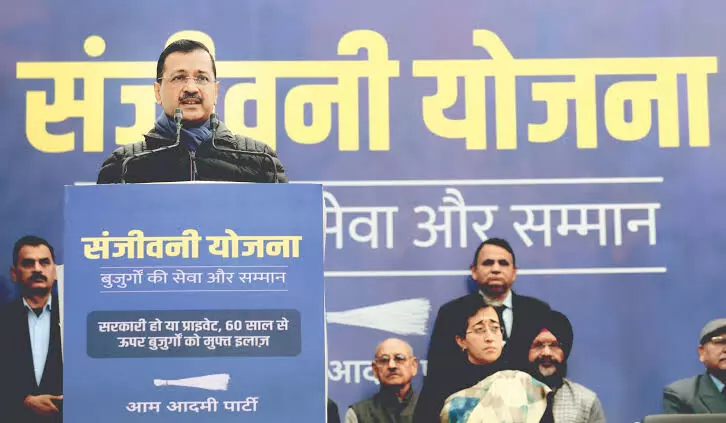Transforming Elderly Healthcare with AAP’s Sanjeevani
The Aam Aadmi Party's Sanjeevani Yojana promises free medical treatment for senior citizens in Delhi, addressing a critical gap in the healthcare system.;

The recent announcement of the Sanjeevani Yojana by the Aam Aadmi Party (AAP) marks a pivotal moment in the landscape of healthcare provision for senior citizens in Delhi. This ambitious initiative promises free medical treatment for all residents aged 60 and above, with no upper limit on treatment costs, thereby addressing a critical gap in the healthcare system. As Delhi approaches its assembly elections in February 2025, the Sanjeevani Yojana not only aims to improve health outcomes for a vulnerable demographic but also positions AAP as a frontrunner in prioritizing public welfare.
At the heart of the Sanjeevani Yojana is its commitment to unlimited healthcare coverage for senior citizens. Unlike existing schemes such as Ayushman Bharat, which impose financial caps and eligibility criteria, Sanjeevani offers an inclusive safety net that ensures seniors can access necessary medical care without the burden of financial constraints. This is particularly significant in a metropolitan area like Delhi, where healthcare expenses can be prohibitively high.
The scheme encompasses treatment across both government and private hospitals, allowing seniors to choose their preferred facilities. This flexibility not only empowers elderly citizens but also encourages them to seek timely medical attention, which is crucial for managing chronic conditions that often afflict this age group. By removing financial barriers, the Sanjeevani Yojana aims to foster a culture of proactive healthcare engagement among seniors.
The potential benefits of the Sanjeevani Yojana are multifaceted. By covering all medical expenses for seniors, the scheme alleviates financial burdens on families who often struggle with high healthcare costs. This financial security is particularly crucial for those on fixed incomes or pensions. The inclusion of both inpatient and outpatient services ensures that seniors receive comprehensive care without worrying about hidden charges or co-payments. This approach promotes preventive care and encourages regular health check-ups.
With AAP workers facilitating registration and providing health cards at home, the initiative aims to make healthcare services more accessible to those who may have mobility issues or lack digital literacy. The scheme encourages hospitals to maintain high standards of care since they will be catering to an increasing number of patients under this initiative. This could lead to improvements in overall healthcare quality across Delhi.
The timing of the Sanjeevani Yojana’s announcement is strategically aligned with the upcoming assembly elections. By focusing on senior citizens—a demographic that often plays a decisive role in electoral outcomes—AAP seeks to strengthen its support base. The scheme serves not only as a healthcare initiative but also as a strategic political maneuver designed to resonate with voters who prioritize health and well-being for their aging family members.
Kejriwal’s government has faced criticism from opposition parties regarding the implementation of central government schemes like Ayushman Bharat. In response, AAP is positioning the Sanjeevani Yojana as a comprehensive solution that addresses gaps left by national programs while reaffirming its commitment to free healthcare services at the state level. This initiative could potentially enhance AAP’s reputation as a party that delivers on its promises and prioritizes public welfare.
Kejriwal’s personal appeal to senior citizens further strengthens the initiative’s impact. He has expressed his commitment by stating, “The elders of Delhi have always considered me as their son.” This emotional connection resonates deeply with voters who may feel overlooked by other political parties. By framing this initiative as a duty towards elder citizens, AAP fosters a sense of trust and loyalty among constituents.
All in all, the Sanjeevani Yojana represents a landmark development in Delhi’s healthcare policy, promising free medical treatment for senior citizens without any financial constraints. As AAP prepares for elections, this initiative not only addresses immediate healthcare concerns but also reinforces its image as a party dedicated to public welfare.
If successfully implemented, the Sanjeevani Yojana could significantly improve health outcomes for thousands of elderly residents while also shaping electoral dynamics in favor of AAP. By prioritizing senior citizens’ health needs, Delhi can set a precedent for inclusive governance that other states may aspire to emulate. As we look towards February 2025, it will be crucial to monitor how this initiative influences voter sentiment and ultimately impacts Delhi's political landscape.

